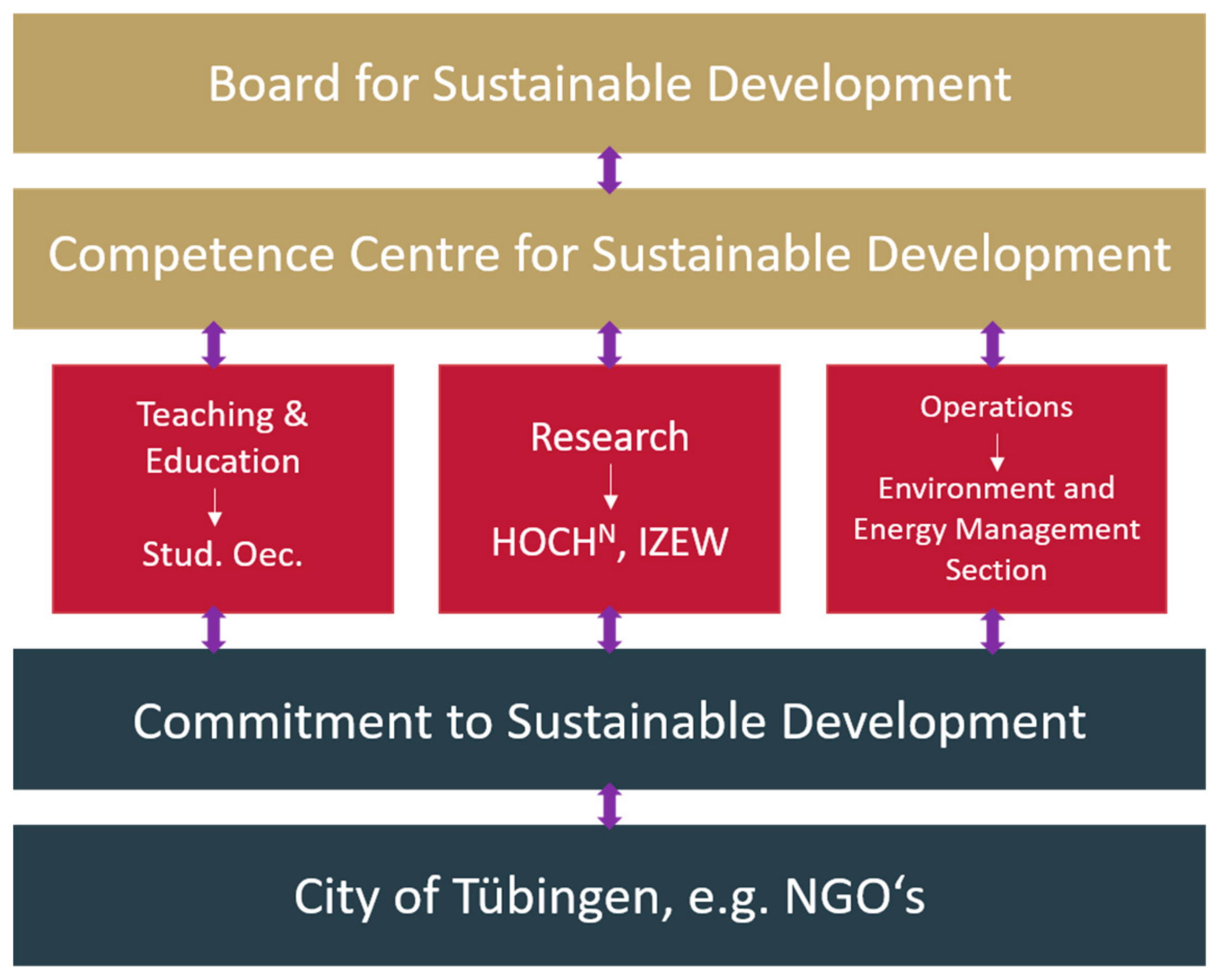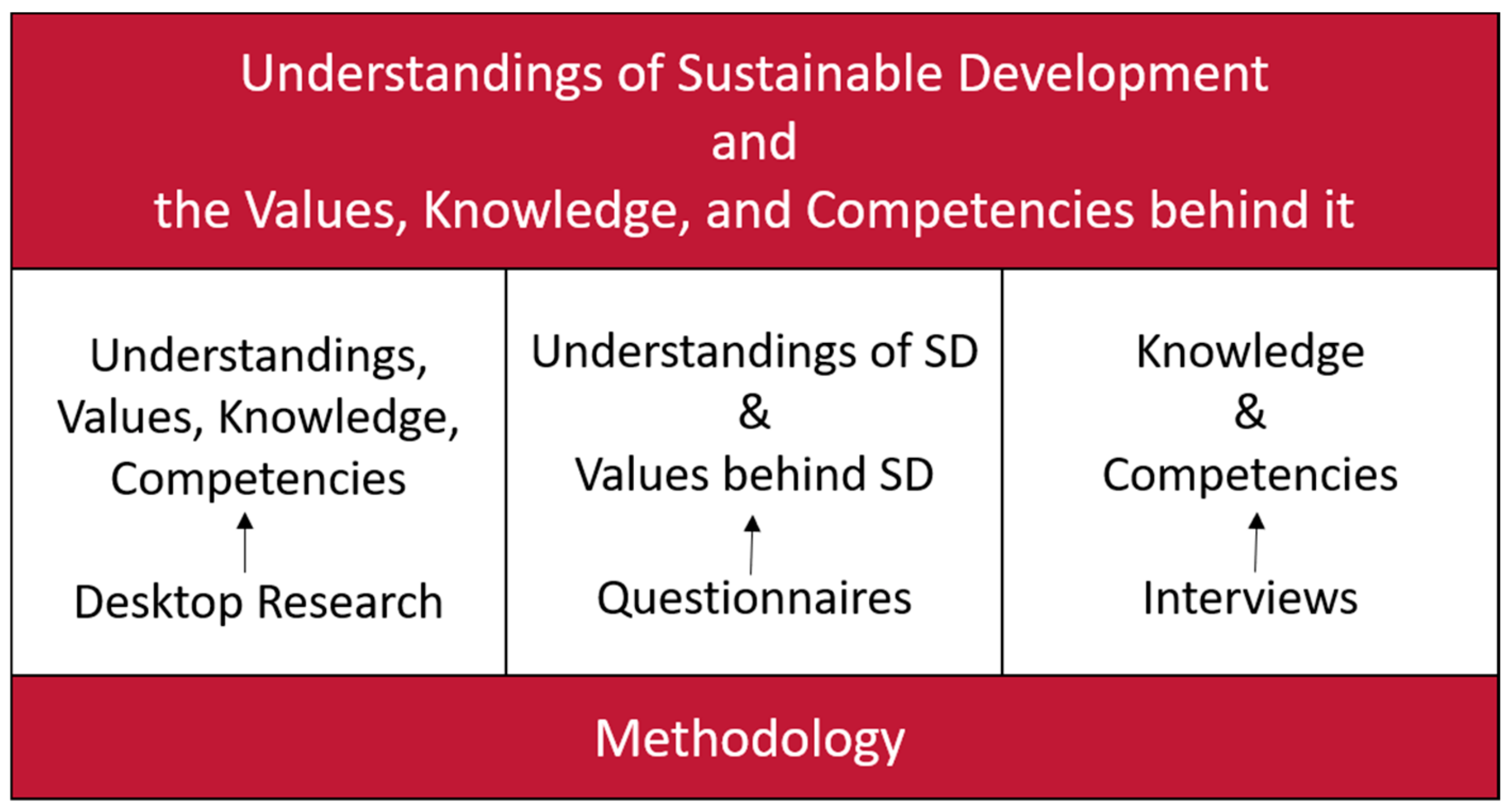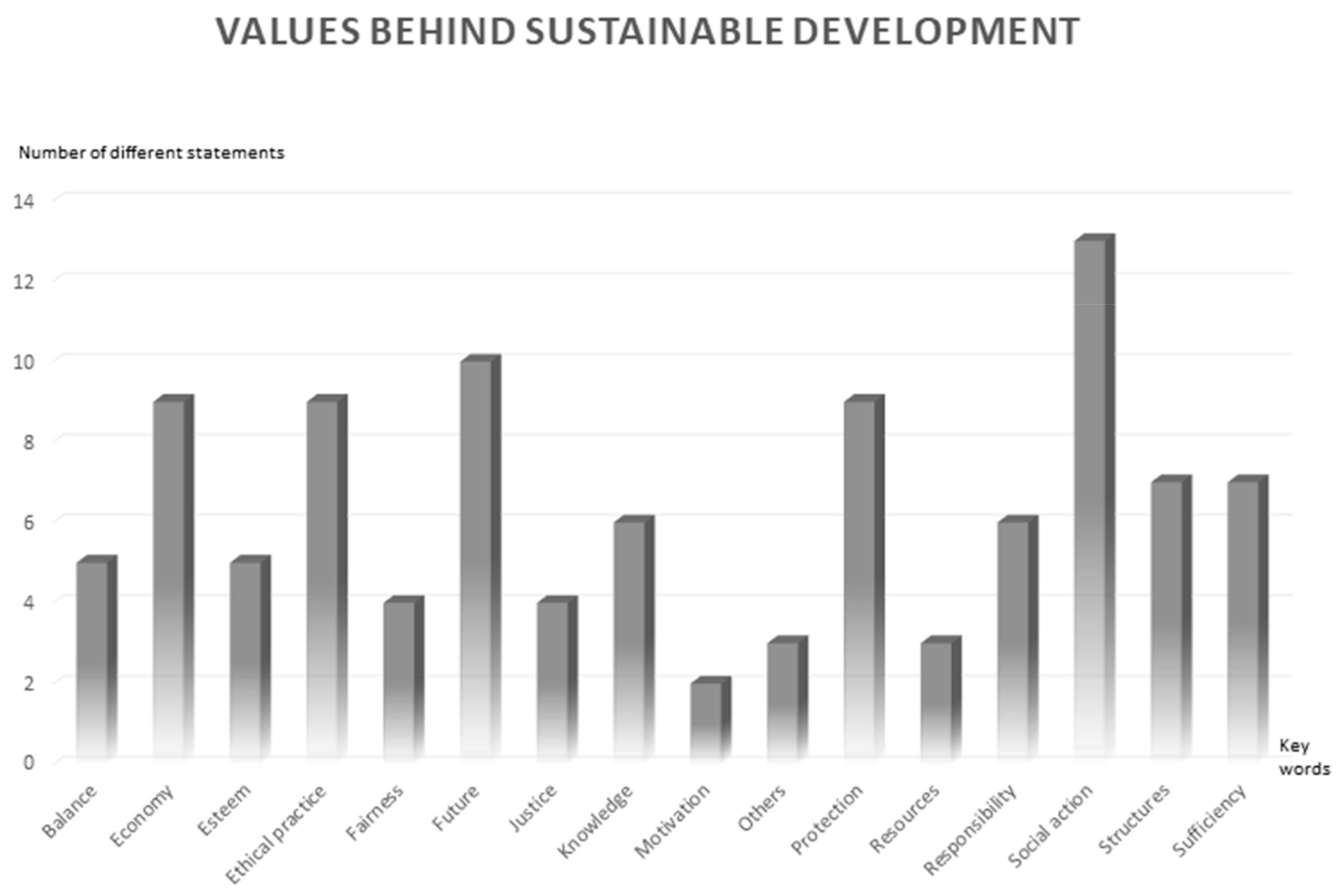The Whole-Institution Approach at the University of Tübingen: Sustainable Development Set in Practice
Abstract
1. Introduction: Topic and Structure of the Article
“Why should I be studying for a future that soon may be no more, when no one is doing anything to save that future?”(Greta Thunberg, climate activist) [1]
- What is the understanding of SD of actors, who are involved in different fields of SD at the University of Tübingen?
- How and where shall SD be implemented at the University of Tübingen?
- What kind of knowledge and which competencies do actors need to implement SD in the areas of operations, research, governance, transfer, teaching and education, and sustainability reporting?
2. State of the Art
2.1. Understandings of Sustainable Development
2.2. Understandings of SD of Stakeholders at HEIs
2.3. The Whole-Institution Approach and HOCH-N’s Fields of Action
2.4. Knowledge and Competencies to Implement SD at HEIs
3. The Tübingen Case: The Competence Centre and its Research Project
3.1. One University, One Centre, Many Activities and Partners—The Competence Center for Sustainable Development
3.2. The Research Project “SD@UT”
- What is the understanding of SD of Tübingen University’s actors who are involved in different fields of SD?
- How and where shall SD be implemented at the University of Tübingen?
- What kind of knowledge and which competencies do actors need to implement SD in the areas of operations, research, governance, transfer, teaching and education, and sustainability reporting?
3.3. Methods
3.3.1. Desktop Research
3.3.2. Questionnaires
3.3.3. Interviews
4. Results
4.1. Stakeholder Analysis: Actors Involved in Topics of Sustainable Development
4.2. The Understanding of Sustainable Development at the University of Tübingen, the Values Behind it, and the Interconnection to the Brundtland Report
4.2.1. Understandings of Sustainable Development at the University of Tübingen
4.2.2. Values behind Sustainable Development
4.2.3. What about the Brundtland Concept of SD?
4.3. Which Knowledge and Competencies are Needed to Realize SD in the University of Tübingen? Transfer of Knowledge—Results of the Interviews
4.3.1. Proof of the Hypothesis
4.3.2. Knowledge and Competencies for Each Field of Action
4.3.3. Knowledge and Competencies to Foster SD in General at a HEI—What Do We Have, What Do We Need?
4.3.4. Knowledge and Competencies to Foster SD at a HEI—What Do We Learn?
5. Discussions and Outlook
Author Contributions
Funding
Acknowledgments
Conflicts of Interest
References
- Thunberg, G. Fridays for Future. Available online: https://fridaysforfuture.de/ (accessed on 9 September 2019).
- Hochschulrektorenkonferenz (HRK)—Die Stimme der Hochschulen. “Hochschulen für nachhaltige Entwicklung”. Erklärung der Hochschulrektorenkonferenz (HRK) und der Deutschen UNESCO-Kommission (DUK) zur Hochschulbildung für nachhaltige Entwicklung; Ein Beitrag zur UN-Dekade “Bildung für nachhaltige Entwicklung”; 2009/2010. Available online: https://www.hrk.de/fileadmin/redaktion/A4/Hochschulen_und_Nachhaltigkeit_HRK_DUK.pdf (accessed on 21 January 2020).
- HOCH-N. Sustainability at Higher Education Institutions: Develop—Network—Report. Available online: https://www.hochn.uni-hamburg.de/en.html (accessed on 27 August 2019).
- Albiez, M.; Herth, C.; Potthast, T. “Art to stay or Coffee to go?”—Nachhaltige Entwicklung lehren und lernen in der Praxis. In Turn Knowledge Into Action—Service Learning an der Universität Tübingen; Müller, F., Ed.; TBHD—Tübinger Beiträge zur Hochschuldidaktik (15,2019,1); Universitätsbibliothek Tübingen: Tübingen, Germany, 2019; pp. 27–32. [Google Scholar]
- World Commission on Environment and Development (WCED). Our Common Future (Brundtland-Report); WCED: Oxford, London, 1987. [Google Scholar]
- UN Research. UN Documentation: Environment. Available online: https://research.un.org/en/docs/environment/conferences (accessed on 21 October 2019).
- United Nations. Millennium Development Goals. Available online: https://www.un.org/millenniumgoals/ (accessed on 21 October 2019).
- United Nations. Sustainable Development Goals. Available online: https://sustainabledevelopment.un.org/?menu=1300 (accessed on 13 December 2019).
- Jonas, H. Das Prinzip Verantwortung. Versuch einer Ethik für die technologische Zivilisation, 1st Aufl; Suhrkamp-Taschenbuch 3492; Suhrkamp: Frankfurt am Main, Germany, 1979. [Google Scholar]
- Rawls, J. A Theory of Justice, original ed.; Harvard University Press: Cambridge, MA, USA, 1971. [Google Scholar]
- Parodi, O.; Tamm, K. Personal sustainability: Exploring a new field of sustainable development. In Personal Sustainability: Exploring the Far Side of Sustainable Development; Parodi, O., Tamm, K., Eds.; Routledge: London, UK; New York, NY, USA, 2019; pp. 1–17. [Google Scholar]
- Spindler, E.A. Geschichte der Nachhaltigkeit: Vom Werden und Wirken eines beliebten Begriffes. Available online: https://www.nachhaltigkeit.info/media/1326279587phpeJPyvC.pdf (accessed on 21 October 2019).
- Kopfmüller, J.; Brandl, V.; Jörissen, J.; Paetau, M.; Banse, G.; Coenen, R.; Grunwald, A. Nachhaltige Entwicklung integrativ betrachtet. Konstitutive Elemente, Regeln, Indikatoren; Global zukunftsfähige Entwicklung—Perspektiven für Deutschland 1; Sigma: Berlin, Germany, 2001. [Google Scholar]
- Ott, K.; Döring, R. Theorie und Praxis starker Nachhaltigkeit, 3rd Aufl.; Beiträge zur Theorie und Praxis starker Nachhaltigkeit 1; Metropolis: Marburg, Germany, 2011. [Google Scholar]
- Grunwald, A. Nachhaltigkeit verstehen. In Arbeiten an der Bedeutung nachhaltiger Entwicklung; Oekom: München, Germany, 2016. [Google Scholar]
- Ott, K. Leitlinien einer starken Nachhaltigkeit: Ein Vorschlag zur Einbettung des Drei-Säulen-Modells. GAIA 2009, 18, 25–28. [Google Scholar] [CrossRef]
- Reid, A.; Petocz, P. University Lecturers’ Understanding of Sustainability. High. Educ. 2006, 51, 105–123. [Google Scholar] [CrossRef]
- Sammalisto, K.; Lindhqvist, T. Integration of Sustainability in Higher Education: A Study with International Perspectives. Innov. High. Educ. 2008, 32, 221–233. [Google Scholar] [CrossRef]
- Wright, T. University presidents’ conceptualizations of sustainability in higher education. Int. J. Sustain. High. Educ. 2010, 11, 61–73. [Google Scholar] [CrossRef]
- Wright, T.S.A.; Wilton, H. Facilities management directors’ conceptualizations of sustainability in higher education. J. Clean. Prod. 2012, 31, 118–125. [Google Scholar] [CrossRef]
- Barth, M.; Rieckmann, M. Academic staff development as a catalyst for curriculum change towards education for sustainable development: An output perspective. J. Clean. Prod. 2012, 26, 28–36. [Google Scholar] [CrossRef]
- Sammalisto, K.; Sundström, A.; Holm, T. Implementation of sustainability in universities as perceived by faculty and staff – a model from a Swedish university. J. Clean. Prod. 2015, 106, 45–54. [Google Scholar] [CrossRef]
- Wals, A.E.J. Sustainability in higher education in the context of the UN DESD: A review of learning and institutionalization processes. J. Clean. Prod. 2014, 62, 8–15. [Google Scholar] [CrossRef]
- Sibbel, A. Pathways towards sustainability through higher education. Int. J. Sustain. High. Educ. 2009, 10, 68–82. [Google Scholar] [CrossRef]
- Pittman, J. Living Sustainability through Higher Education: A Whole Systems Design Approach to Organizational Change. In Higher Education and the Challenge of Sustainability: Problematics, Promise, and Practice; Corcoran, P.B., Wals, A.E.J., Eds.; Kluwer Academic Publishers: Dordrecht, The Netherlands, 2004; pp. 199–212. [Google Scholar]
- Buckler, C.; Creech, H. Shaping the Future We Want. UN Decade of Education for Sustainable Development (2005–2014): Final Report; DESD Monitoring and Evaluation; UNESCO: Paris, France, 2014. [Google Scholar]
- Ferreira, J.-A.; Ryan, L.; Tilbury, D. Whole-School Approaches to Sustainability. A Review of Models for Professional Development in Pre-Service Teacher Education; Australian Research Institute in Education for Sustainability, Macquarie University: North Ryde, NSW, Australian, 2006. [Google Scholar]
- Mogren, A.; Gericke, N.; Scherp, H.-Å. Whole school approaches to education for sustainable development: A model that links to school improvement. Environ. Educ. Res. 2019, 25, 508–531. [Google Scholar] [CrossRef]
- Mcmillin, J.; Dyball, R. Developing a Whole-of-University Approach to Educating for Sustainability. J. Educ. Sustain. 2009, 3, 55–64. [Google Scholar] [CrossRef]
- Littledyke, M.; Manolas, E.; Littledyke, R.A. A systems approach to education for sustainability in higher education. Int. J. Sustain. High. Educ. 2013, 14, 367–383. [Google Scholar] [CrossRef]
- Disterheft, A.; Azeiteiro, U.M.; Leal Filho, W.; Caeiro, S. Participatory processes in sustainable universities – what to assess? Int. J. Sustain. High. Educ. 2015, 16, 748–771. [Google Scholar] [CrossRef]
- Lozano, R.; Ceulemans, K.; Alonso-Almeida, M.; Huisingh, D.; Lozano, F.J.; Waas, T.; Lambrechts, W.; Lukman, R.; Hugé, J. A review of commitment and implementation of sustainable development in higher education: Results from a worldwide survey. J. Clean. Prod. 2015, 108, 1–18. [Google Scholar] [CrossRef]
- Leal Filho, W.; Wu, Y.-C.J.; Brandli, L.L.; Avila, L.V.; Azeiteiro, U.M.; Caeiro, S.; Madruga, L.R.d.R.G. Identifying and overcoming obstacles to the implementation of sustainable development at universities. J. Integr. Environ. Sci. 2017, 14, 93–108. [Google Scholar] [CrossRef]
- Koester, R.J.; Eflin, J.; Vann, J. Greening of the campus: A whole-systems approach. J. Clean. Prod. 2006, 14, 769–779. [Google Scholar] [CrossRef]
- Forschung zu Nachhaltigkeit und Globalem Wandel—Wissenschaftspolitische Visionen der Schweizer Forschenden; Forum für Klima und Global Change—Schweizerische Akademie der Naturwissenschaften (CASS (Konferenz der Schweizerischen Wissenschaftlichen Akademien); ProClim, Ed.; CASS/SANW: Bern, Switzerland, 1997. [Google Scholar]
- Rieckmann, M. Future-oriented higher education: Which key competencies should be fostered through university teaching and learning? Futures 2012, 44, 127–135. [Google Scholar] [CrossRef]
- Wiek, A.; Withycombe, L.; Redman, C.L. Key competencies in sustainability: A reference framework for academic program development. Sustain. Sci. 2011, 6, 203–218. [Google Scholar] [CrossRef]
- De Haan, G. The BLK ‘21’ programme in Germany: A ‘Gestaltungskompetenz’-based model for Education for Sustainable Development. Environ. Educ. Res. 2006, 12, 19–32. [Google Scholar] [CrossRef]
- De Haan, G. Bildung für Nachhaltige Entwicklung—ein neues Lern- und Handlungsfeld; UNESCO Heute: Paris, France, 2006; No. 1; pp. 4–8. [Google Scholar]
- Lozano, R.; Merrill, M.; Sammalisto, K.; Ceulemans, K.; Lozano, F. Connecting Competences and Pedagogical Approaches for Sustainable Development in Higher Education: A Literature Review and Framework Proposal. Sustainability 2017, 9, 1889. [Google Scholar] [CrossRef]
- UNESCO. Leitlinien für Wissenschaft für nachhaltige Entwicklung in Forschung und Lehre; (Nichtabschließend abgestimmte); Arbeitsübersetzung der Deutschen UNESCO-Kommission: Paris, France, 2017. [Google Scholar]
- Hirsch Hadorn, G.; Bradley, D.; Pohl, C.; Rist, S.; Wiesmann, U. Implications of transdisciplinarity for sustainability research. Ecol. Econ. 2006, 60, 119–128. [Google Scholar] [CrossRef]
- Herth, C.; Petrlic, A.; Potthast, T. Lehre heute für die Herausforderungen von morgen: Studium Oecologicum und Bildung für Nachhaltige Entwicklung an der Universität Tübingen. In Nachhaltigkeit in der Lehre: Eine Herausforderung für Hochschulen; Leal Filho, W., Ed.; Theorie und Praxis der Nachhaltigkeit; Springer Spektrum: Berlin, Germany, 2018; pp. 208–222. [Google Scholar]
- University of Tübingen. Board for SD. Available online: https://uni-tuebingen.de/de/79228 (accessed on 23 September 2019).
- University of Tübingen. EMAS Audit. Available online: https://uni-tuebingen.de/de/87762 (accessed on 23 September 2019).
- Geibel, J. Hochschulen in nachhaltiger Entwicklung. In Zukunftsfähige Hochschulen gestalten: Beispiele des Gelingens aus Lehre, Forschung, Betrieb, Governance und Transfer, 2nd ed.; Netzwerk, n.e.V., Ed.; Self-Published: Berlin, Germany, 2018; pp. 6–9. [Google Scholar]
- Competence Centre for Sustainable Development. Network meetings. Available online: https://uni-tuebingen.de/de/93082 (accessed on 24 September 2019).
- Competence Centre for Sustainable Development. Studentisches Vernetzungstreffen: “Zukunftsfähige Uni—One Friday for Future”. Available online: https://uni-tuebingen.de/de/160369 (accessed on 24 September 2019).
- Garnåsjordet, P.A.; Aslaksen, I.; Giampietro, M.; Funtowicz, S.; Ericson, T. Sustainable Development Indicators: From Statistics to Policy. Environ. Policy Gov. 2012, 22, 322–336. [Google Scholar] [CrossRef]
- Bloemertz, L. Alternativen unseres Ernährungssystems—Strukturierungsmöglichkeiten und Potenziale; Presentation on the German Congress for Geography; Christian-Albrechts-University of Kiel: Kiel, Germany, 25–30 September 2019. [Google Scholar]
- Vogt, M.; Weber, C.F.; Lütke-Spatz, L.; Von Stecker, C. Transfer für nachhaltige Entwicklung an Hochschulen (Beta-Version); BMBF-Projekt “Nachhaltigkeit an Hochschulen: Entwickeln–vernetzen–berichten (HOCH-N)”; HOCH-N: München, Germany, 2018. [Google Scholar]
- Mikkelsen, B. Methods for Development Work and Research: A New Guide for Practitioners; SAGE Publications India Pvt Ltd.: Panchsheel Enclave, New Delhi, India, 2005. [Google Scholar]
- University of Tübingen. GLOBUS—Reconsidering European Contributions to Global Justice. Available online: https://uni-tuebingen.de/de/87641 (accessed on 12 December 2019).
- University of Tübingen. Institute of Evolution and Ecology. Available online: https://uni-tuebingen.de/en/26486 (accessed on 12 December 2019).
- University of Tübingen. SFB 923: “Bedrohte Ordnungen”. Available online: https://bedrohte-ordnungen.de/ (accessed on 12 December 2019).
- University of Tübingen. Studium Oecologicum. Available online: https://uni-tuebingen.de/de/81653 (accessed on 23 September 2019).
- University of Tübingen. Environmental Biotechnology. Available online: https://uni-tuebingen.de/de/97376 (accessed on 12 December 2019).
- University of Tübingen. Zentrum für Islamische Theologie. Available online: https://uni-tuebingen.de/de/59992?tx_news_pi1[news]=41174 (accessed on 12 December 2019).
- University of Tübingen. attempto online: Mehrfach ausgezeichnet: Universität Tübingen gilt als “Recyclingpapierfreundliche Hochschule”. Available online: https://uni-tuebingen.de/de/62170?tx_news_pi1[news]=29386 (accessed on 12 December 2019).
- University of Tübingen. Kostenloser Ladestrom für Pedelecs. Available online: https://uni-tuebingen.de/de/95382 (accessed on 12 December 2019).
- University of Tübingen. Universität Tübingen hat auf Ökostrom umgestellt. Available online: https://uni-tuebingen.de/de/95382 (accessed on 12 December 2019).
- University of Tübingen. The Advisory Board for Sustainable Development. Available online: https://uni-tuebingen.de/en/79228 (accessed on 12 December 2019).
- Studentische Vertretung im Beirat für Nachhaltige Entwicklung, Uni Tübingen. Available online: https://www.facebook.com/StudierendeBeiratNachhaltigkeit/ (accessed on 12 December 2019).
- University of Tübingen. EMAS an der Universität Tübingen. Available online: https://uni-tuebingen.de/en/87762 (accessed on 12 December 2019).
- Competence Centre for Sustainable Development. Deutscher Nachhaltigkeitskodex (DNK). Available online: https://uni-tuebingen.de/de/48701 (accessed on 12 December 2019).
- University of Tübingen. Umwelterklärung 2018. Available online: https://uni-tuebingen.de/en/95382 (accessed on 12 December 2019).
- University of Tübingen. Gegen die Becherflut und überquellende Mülleimer: ReCup in Tübingen. Available online: https://uni-tuebingen.de/en/95382 (accessed on 12 December 2019).
- Papierpilz. Kreatives Prärecycling. Available online: https://papierpilz.wordpress.com/ (accessed on 12 December 2019).
- University of Tübingen. The University branches in East Asia. Available online: https://uni-tuebingen.de/en/93407 (accessed on 12 December 2019).
- Competence Centre for Sustainable Development. Sustainability Lecture. Available online: https://uni-tuebingen.de/de/35885 (accessed on 23 September 2019).
- Competence Centre for Sustainable Development. Sustainability Award for Thesis. Available online: https://uni-tuebingen.de/de/32417 (accessed on 23 September 2019).
- Niedlich, S.; Kummer, B.; Bauer, M.; Rieckmann, M.; Bormann, I. Cultures of sustainability governance in higher education institutions: A multi-case study of dimensions and implications. High. Educ. Q. 2019, 171, 434. [Google Scholar] [CrossRef]
- University of Tübingen. Leitbild. Available online: https://uni-tuebingen.de/de/13046 (accessed on 12 December 2019).
- Döring, R.; Ott, K. Nachhaltigkeitskonzepte. Zeitschrift für Wirtschafts- und Unternehmensethik 2001, 2, 315–339. [Google Scholar]
- Paech, N. Nachhaltigkeitsprinzipien jenseits des Drei-Säulen-Modells. Nat. und Kultur 2006, 7, 42–62. [Google Scholar]
- Elkington, J. 25 Years Ago I Coined the Phrase “Triple Bottom Line.” Here’s Why It’s Time to Rethink It. Available online: https://hbr.org/2018/06/25-years-ago-i-coined-the-phrase-triple-bottom-line-heres-why-im-giving-up-on-it (accessed on 23 September 2019).
- Acosta, A. Buen vivir. In Vom Recht auf ein gutes Leben; Oekom: München, Germany, 2015. [Google Scholar]
- Wissenschaftlicher Beirat der Bundesregierung Globale Umweltveränderungen (WBGU). Forschung und Bildung für die Transformation. Available online: https://www.wbgu.de/fileadmin/user_upload/wbgu/publikationen/factsheets/fs5_2012/wbgu_fs5.pdf (accessed on 10 October 2019).
- Competence Centre for Sustainable Development. Energieerzeugung am Kivu-See. Available online: https://uni-tuebingen.de/de/164320 (accessed on 23 September 2019).



| Field of Action | Exemplary Activities Carried Out at the University of Tübingen |
|---|---|
| Research | |
| Teaching and Education | |
| Operations | |
| Governance | |
| Sustainability reporting |
|
| Transfer |
| Key Word(s) | Number of Different Statements | Key Word(s) | Number of Different Statements |
|---|---|---|---|
| Consumption | 5 | Others | 2 |
| Education, consciousness, sensitization | 14 | Preservation of resources | 16 |
| Infrastructure | 3 | Protection, avoidance of damages, preservation | 10 |
| Justice | 10 | Structures and processes | 4 |
| Levels of SD | 14 | Theoretical basis | 2 |
| Management | 7 | Transfer, realization | 10 |
| Understandings of SD [Number of Statements] | Key Word(s) | Values Behind SD [Number of Statements] |
|---|---|---|
| 10 | Justice | 4 |
| 16 | (preservation of) Resources | 3 |
| 10 | Protection (avoidance of damages, preservation) | 9 |
© 2020 by the authors. Licensee MDPI, Basel, Switzerland. This article is an open access article distributed under the terms and conditions of the Creative Commons Attribution (CC BY) license (http://creativecommons.org/licenses/by/4.0/).
Share and Cite
Schopp, K.; Bornemann, M.; Potthast, T. The Whole-Institution Approach at the University of Tübingen: Sustainable Development Set in Practice. Sustainability 2020, 12, 861. https://doi.org/10.3390/su12030861
Schopp K, Bornemann M, Potthast T. The Whole-Institution Approach at the University of Tübingen: Sustainable Development Set in Practice. Sustainability. 2020; 12(3):861. https://doi.org/10.3390/su12030861
Chicago/Turabian StyleSchopp, Kerstin, Matthias Bornemann, and Thomas Potthast. 2020. "The Whole-Institution Approach at the University of Tübingen: Sustainable Development Set in Practice" Sustainability 12, no. 3: 861. https://doi.org/10.3390/su12030861
APA StyleSchopp, K., Bornemann, M., & Potthast, T. (2020). The Whole-Institution Approach at the University of Tübingen: Sustainable Development Set in Practice. Sustainability, 12(3), 861. https://doi.org/10.3390/su12030861




